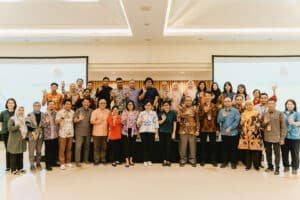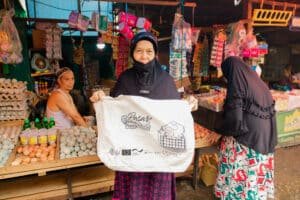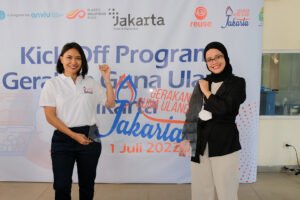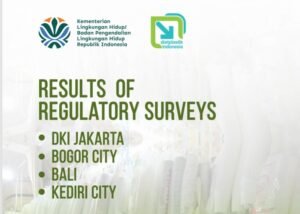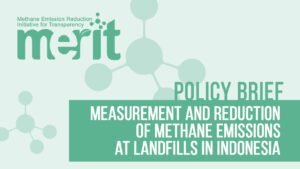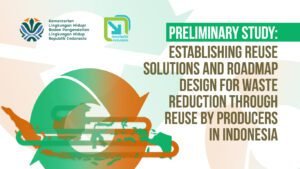Bali Province has banned single-use plastic bags, plastic straws and plastic polystyrene (styrofoam) since July 1 2019 through Regulation of the Governor of Bali Province Number 97 of 2018 concerning Restrictions on the Generation of Single-Use Plastic Waste.
This regulation has gone through various challenges and has even been challenged through a judicial review lawsuit at the Supreme Court by business actors. However, the Supreme Court ruled in favor of Bali Province in this case, and ruled that the Regional Government has the authority to ban single-use plastic.
After two years of implementation, the Governor’s Regulation shows the positive impact of reducing single-use plastic in Bali. The Bali Province Forestry and Environment Service together with the Indonesian Zero Waste Alliance (AZWI), the Indonesian Plastic Bag Diet Movement, PPLH Bali, and the Nexus3 Foundation have carried out a monitoring and evaluation study of these regulations which was carried out in November – December 2020.
Methodology
The study was carried out using quantitative and qualitative methodology, and utilized primary data. Quantitative data was obtained through a survey method using a questionnaire with direct face-to-face interview techniques. Respondent data was collected by spreading the research team to 716 villages/subdistricts in nine districts/cities in Bali using the multistage random sampling method, during 9 – 26 November 2020. The number of respondents per city/district was selected proportionally according to the comparative number of family heads. There is. During the data collection period, the final number of respondents was 1,605 heads of families, with a margin of error for this survey of 2.45% at a 95% confidence level. The construction of the questionnaire used is mostly dominated by closed questions, either with dichotomous, multiple choice, or Likert scale responses, which cover demographic aspects, routine and non-routine shopping behavior, and the use of single-use plastic at each shopping location.
Survey Distribution

Meanwhile, qualitative data was obtained through focused group discussions (DKT) which were held three times on 4 – 7 November 2020. Discussions were carried out with three different groups of participants, namely (1) regional government representatives—represented by the Regency/City Environmental Service, ( 2) business groups (represented by business actors consisting of the food and beverage service industry (hotels, restaurants and cafes) and retail (shopping centers, modern shops and people’s markets), and (3) representatives of civil society groups (namely bank groups waste and recycling, organic waste processing (composting) groups, clean up community groups and waste care community groups (KKPS). implementation of Governor’s Regulations, opportunities, and ideas for action plans to be developed in the future.
Balinese people are reducing their consumption of plastic bags, straws and styrofoam, but compliance by plastic retailers and distributors needs to be improved

The research results show an overall reduction in single-use plastic consumption at the household level. The highest reduction in plastic bag consumption (up to 100%) is made by people when shopping in shopping centers, followed by modern stores (up to 80%). The majority of respondents still use single-use plastic when shopping at traditional markets and stalls, so the reduction in markets and stalls is only 20%. This is in line with the confession of plastic bag traders at the people’s market in the city of Denpasar, who since the regulation was implemented have experienced a decline in turnover of 20-30%. This data is also supported by the statement from the Indonesian Retail Entrepreneurs Association (APRINDO) Bali, which admitted that many modern shops no longer provide 100% plastic bags, but small shops still do.
The reduction in single-use plastic continues to occur when entering the COVID-19 pandemic, apart from continuing changes in individual behavior to reduce plastic, many shops and restaurants are closed. However, this research does not cover online shopping behavior, either through marketplaces or food delivery services.
Overall, Gubernatorial Regulation 97/2018 succeeded in encouraging changes in household behavior in the form of reducing consumption of plastic bags by 57%, straws by up to 70%, and styrofoam by up to 81%. However, you can still find plastic bags in markets and stalls, as well as straws and styrofoam in restaurants and stalls. This indicates that there is public awareness to reduce the use of these goods, but this is not necessarily accompanied by business actors’ compliance with regulations.
In Bali, apart from Bali Governor Regulation no. 97 of 2018 concerning Restrictions on the Generation of Single-Use Plastic Waste, there is also Denpasar Mayor Regulation No. 36 of 2018 concerning Reducing the Use of Plastic Bags, and Badung Regent Regulation Number 47 of 2018 concerning Reducing the Use of Plastic Bags. During focused group discussions, concerns arose that these different regulations had the potential to confuse and make implementation difficult, partly because straws and styrofoam are prohibited at the provincial level, but in the Denpasar Mayor’s Regulation and the Badung Regent’s Regulation these two products are not mentioned. However, data shows that the largest reduction in plastic bags, with figures above 60%, occurred in Badung, Denpasar and Karangasem. The largest reduction in styrofoam occurred in Badung, Bangli, Denpasar, Jembrana, Karangasem, Klungkung and Tabanan with figures above 80%. Meanwhile, the largest reduction in straws occurred in Badung, Denpasar, Karangasem and Klungkung with figures above 70%. This indicates that regulations at the provincial level can be implemented quite well even in areas that have slightly different regulations such as Denpasar and Badung.
The challenges of implementing Pergub 97/2018 need to be addressed collaboratively by the government, business actors and community groups
The study also shows that there are challenges in implementing and enforcing the law of Governor Regulation 97/2018. These challenges can be divided into 3 broad categories, namely database challenges, coordination challenges, and challenges in implementing administrative sanctions.
Database Challenges
Gubernatorial Regulation 97/2018 applies to producers, distributors, suppliers, business actors and providers of single-use plastic in Bali. Therefore, it is necessary to collect data on each of these parties, as well as their activities related to single-use plastic. However, there are obstacles because data on the number of business actors, especially food and beverage services (hotels, restaurants, cafes) and retail (shopping centers, modern shops and public markets) is incomplete so it is difficult to determine the “baseline” situation before intervention in these business actors and state after intervention. In 2019, DKLH carried out mapping of single-use plastic producers and suppliers/distributors in Bali. From this mapping, information was obtained that there are no plastic production activities in Bali, and the supply of single-use plastic to Bali is still occurring but has been reduced by 40%. However, this data is difficult to verify, because business actors are still resistant to opening the data.
Coordination challenges
Supervision of business actors is still hampered by the pandemic, in addition to the quite complex coordination process that needs to be implemented with districts/cities. The Provincial Government is expected to provide guidance and format for inspection reports that are clear, uniform and easy for districts/cities to follow, because the authority to implement regulations in the field lies with the districts/cities.
Apart from that, there is an opportunity for stronger coordination through the implementation of Article 18 of Pergub 97/2018, namely through the formation of a Monitoring and Evaluation Team for the Implementation of Restrictions on the Generation of Single-Use Plastic Waste. The team can consist of multi-stakeholder elements including regional officials, academics, non-governmental organizations, entrepreneurs, religious leaders, traditional leaders and community leaders. It is hoped that the team will be formed inclusively and embrace various parties so that they can participate collaboratively in carrying out supervision to support the implementation of Bali Gubernatorial Regulation 97/2018. This can also ensure that regulations are implemented comprehensively by all stakeholders, and are not just a burden on the Government.
Challenges in implementing administrative sanctions
The implementation of administrative sanctions is deemed not to have occurred, giving the impression that there is no legal certainty in implementing the single-use plastic ban in Bali. In fact, Bali Gubernatorial Regulation 97/2018 clearly states that violators will be subject to administrative sanctions in accordance with statutory provisions.
Apart from implementing administrative sanctions, Bali Gubernatorial Regulation 97/2018 also opens up opportunities to give awards to agencies, business actors, institutions and the public who show high compliance. Even traditional villages / Pakraman villages that are successful in implementing restrictions on the generation of single-use plastic waste can be given awards in the form of facilities / infrastructure or assistance with village incentive funds. Giving this award needs to be carried out considering that the role of community leadership such as Traditional Villages is very influential in changing behavior.
By improving databases and coordination as well as standardizing monitoring mechanisms, the application of administrative sanctions and awards will be easier to implement in the future.
There is still confusion among the public and business actors regarding packaging that claims to be biodegradable
Gubernatorial Regulation 97/2018 defines single-use plastic as tools/materials that are “made from or contain basic ingredients of plastic, synthetic latex, polyethylene, thermoplastic synthetic polymeric and intended for single use”. The widespread use of single-use packaging which is claimed to be environmentally friendly and biodegradable is also a challenge in Bali. Several studies regarding packaging that is labeled and marketed as biodegradable, compostable, or oxo-biodegradable show that the decomposition process of the packaging does not occur naturally. Consumers are often unaware that items labeled ‘compostable’ cannot be composted on a household scale and therefore require special industrial composting facilities, which are not available in Bali or other locations in Indonesia. Therefore, confirmation is needed from the Bali Provincial Government regarding whether the product contains plastic, synthetic latex, polyethylene or thermoplastic synthetic polymeric ingredients which are actually prohibited in Bali. This can be confirmed through guidance on monitoring mechanisms by the Provincial Government.
A study by Kopernik, a non-governmental organization in Bali, has tested the visual degradation of several packages marketed as biodegradable, compostable, and oxo-biodegradable. The visual degradation testing of this packaging was located in Bali and carried out for six months in various environments, namely: isolated (control), home composting, semi-industrial composting (industrial composting facilities are not available in Bali, therefore Kopernik was unable to carry out the experiment at the facility industrial composting), in the sea, buried in the ground, and in the open air.
This experimentation proved that packaging labeled as compostable, biodegradable, oxo-biodegradable did not experience significant visual degradation over a six month period in all test environments. Further testing in the laboratory is needed to assess the composability, biodegradability and polymer content of these packages.
Contribute solutions from local wisdom and traditional Balinese markets
Apart from the decline in single-use plastic consumption in Bali, the study also found that 86% of respondents admitted that they had no difficulty in finding alternatives to plastic bags, which was supported by 94% of respondents stating that they already had reusable shopping bags. Apart from reusable shopping bags, 9.66% of respondents have reusable straws and 37.94% of respondents have reusable food containers or containers. This shows that the majority of Balinese people are committed to reducing consumption of single-use plastic through the use of their own reusable bags or containers.
There are many solutions that Balinese people can and have done to replace single-use shopping bags. Based on Kopernik’s explanation, there is great potential for Bali to revive local wisdom in the form of bags and containers made from bamboo, coconut and banana leaves which have long been used by the Balinese people.
“We have a variety of local potential that can be used as an alternative to single-use plastic. “It requires the role and commitment of the government, the private sector and citizens to make its use even more widespread,” said Andre Dananjaya, as Associate Manager at Kopernik and Co-producer of the film Pulau Plastik.
For the retail sector, especially modern shops, APRINDO Bali said that before the implementation of the regulation, a lot of expenses were spent on providing plastic bags, so with this regulation they are quite profitable because they save expenses. APRINDO Bali also admitted that there were not many obstacles in modern stores, only at the beginning of implementation because changes in behavior had not been uniform, both from the side of business actors and consumers.
“The savings mentioned by APRINDO should also be felt by traditional market traders and food stalls. However, changes in behavior in traditional markets require a more intensive approach, because the traders are diverse, unlike modern chain stores which are subject to one management. An intensive approach to restaurants and stalls also needs to be taken. Gubernatorial Regulation 97/2018 has been proven to encourage significant behavioral changes. “Of course it can be more optimal if there is improved collaborative data collection, coordination and supervision,” explained Tiza Mafira, as Executive Director of the Indonesian Plastic Bag Diet Movement.
“This regulation has shown that a policy is very possible to change behavior. It is proven from the results of monitoring and evaluation that we have carried out that there has been a decrease in the use of plastic bags, straws and styrofoam from consumption which has become a daily habit. In the future, we will expand plastic reduction education disposable to schools and campaigns in traditional markets,” added I Made Teja, Head of the Bali Province Forestry and Environment Service.
*****
This study was also supported by Ida Bagus Mandhara Brasika, S.Si, M.Sc and 40 surveyors from 9 regencies/cities throughout Bali Province as well as Focus Group Discussion (FGD) participants from the environmental services of regencies/cities throughout -Bali Province, modern retail businesses, markets, restaurants and hotels, and civil society groups.

